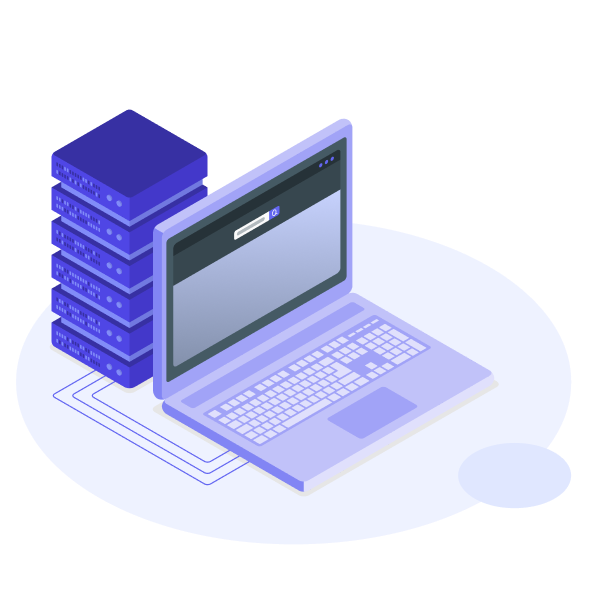Today, many organizations and software developers are trying to find cost-effective solutions for testing hardware and software apps. So. it’s hard to buy a new OS or hardware to test the proposed solution. For this purpose, emulators are used to test software applications. An emulator is a program that allows one device to simulate the functionality of another, creating a virtual machine environment.
Emulators are commonly used for tasks like testing software, playing games not designed for the current system, or running different operating systems. However, they can sometimes encounter challenges such as slow performance, rendering glitches, compatibility issues, and instability. For this reason, selecting an efficient emulator for low end PCs is essential.
In this article, we will discuss the list of best emulators for Low End PC. This comprehensive article explores the features, benefits, drawbacks, and pricing of various emulators. This detailed guide can assist you in selecting the perfect emulator for your needs.
Be sure to check out this insightful and trustworthy resource.
What are the Common Use Cases for Emulators?
Emulators are efficient and cost-effective solutions for testing software and hardware. Below, we have listed some common use cases for using low end pc emulators:
Simulating Devices
Emulators can mimic devices such as gaming consoles or mobile phones, enabling you to run software designed for those platforms on your computer. If you want to play classic games originally designed for a console like the PlayStation or Nintendo on your PC, an emulator makes it possible by replicating the console's environment.
Running Incompatible Software
They allow you to run applications or programs that aren’t natively supported by your operating system. For example, using a Linux-based application on a Windows computer.
Resolving Compatibility Issues
Even when software supports multiple operating systems, programming differences can cause crashes or malfunctions. Emulators create a stable, compatible environment to resolve these issues.
Avoiding System Modifications
Emulators eliminate the need to switch operating systems or install additional drivers, which can consume system resources and potentially impact performance.
Development and Testing
Emulators are essential for developers who need to test and build software across different platforms. They enable simultaneous testing on Linux, Windows, and macOS, enhancing productivity and efficiency.
What is an Android Emulator?
An Android emulator is software that allows users to run Android applications on their computer or operating system. It creates a virtual Android environment on your PC, enabling you to install and use apps designed for Android devices.
For both gamers and developers, an Android emulator can provide unique advantages. Many gamers may not have access to high-end Android smartphones, so using a lightweight emulator on a low-end PC offers a cost-effective solution to play games on a larger screen without worrying about battery life or performance limitations. Additionally, developers find Android emulators useful for testing apps, as it is generally faster than testing on physical devices.
In essence, an Android emulator for low-end PCs serves as an affordable and efficient alternative to using a real Android device.
What is a Low-End PC?
A Low end PC is a computer designed with basic hardware specifications, typically featuring components like 2GB of RAM, 2GB of storage, and an entry-level processor such as a Ryzen 3 or Intel i3. These machines are budget-friendly options for gamers and developers, and with the help of a lightweight emulator, they can be optimized to perform efficiently despite their modest capabilities.
How Does an Android Emulator Work on Low End PCs?
An Android emulator for low end laptops or PC often relies on Quick EMUlator known as QEMU, an open-source virtualization tool that enables users to run guest devices or systems within their existing operating system. QEMU works by emulating hardware and software environments, making it possible to run Android applications on a PC.
To optimize the performance of these emulators, many also incorporate a hypervisor—a specialized software layer designed to accelerate virtualization processes. This ensures smoother performance and reduces the time it takes to load programs, even on low-end machines.
Key Features of Android Emulators for Low-End PCs
One of the standout capabilities of Android emulators is their ability to translate the Application Binary Interface (ABI) of the device being emulated into one that matches your actual system. For the best performance, it’s recommended that the guest system (the emulated environment) shares the same architecture as your host machine.
System Requirements for Running Android Emulator for Low End PC
While you can use an Android for low PC emulator, achieving optimal performance requires slightly higher specifications. If you're considering running an emulator at its best, here are the recommended system requirements:
- Operating System: 64-bit Windows, macOS, or Linux
- RAM: 8GB to 16GB
- Disk Space: 16GB
By meeting these requirements, you can ensure a better experience with Android emulators, even on budget-friendly PCs.
Best Android Emulators for Low End PC
Below we are providing the list of best Android emulators for low end pc:
|
Android Emulator
|
Cloud Version
|
APK Files Installation Support
|
Unique feature
|
Best Use For
|
Free
|
|
BlueStacks
|
Yes
|
yes
|
“Multi-Instance”: Play multiple games simultaneously
|
App Development
|
yes(Includes Paid Version)
|
|
Android Studio
|
Yes
|
yes
|
One-click Keyboard Mapping
|
App Development
|
yes
|
|
NoxPlayer
|
No
|
yes
|
“Built-in Nimo TV” (Live game streaming platform)
|
Gaming
|
yes
|
|
LDPlayer
|
No
|
yes
|
Keyboard-free gamepad
|
Gaming
|
yes
|
|
LambdaTest
|
yes
|
yes
|
Cross-browser testing
|
App Testing
|
yes (Includes Paid Version)
|
|
KoPlayer
|
no
|
yes
|
Game footage record
|
Gaming
|
yes
|
|
Genymotion
|
yes
|
no
|
“Disk IO Throttling” to improve performance
|
App Testing
|
yes
|
|
MEmu Play
|
no
|
yes
|
“Custom Macro”: Advanced key-mapping
|
Gaming
|
yes(Includes Paid Version)
|
|
GameLoop
|
yes
|
yes
|
“Gaming Optimized” for games like PUBG
|
Gaming
|
yes
|
|
MSI App Player Emulator
|
No
|
yes
|
“Console mode”:
Gives you a console-like experience
|
Gaming
|
yes
|
1. Bluestacks
Bluestacks is one of the top Android emulator software choices for running Android games. It offers customization options such as adjusting the aspect ratio, resolution, and frame rate to suit your preferences, which helps enhance performance and graphics quality.
The emulator also features native game controls that automatically adjust to the input requirements of each game or app. It converts Android game controls into easy-to-use PC-style controls, enabling you to play games using your mouse, keyboard, or gamepad. Additionally, Bluestacks lets you optimize your PC’s memory usage with a single click, freeing up system resources for better performance.
Bluestacks offers several features designed to enhance the user experience. The Multiple instance feature allows you to run multiple Android apps at the same time, making multitasking easy. Smart Controls automatically optimize game controls, ensuring key functions like shooting or navigating are quickly accessible, which is great for gaming efficiency.
For low-end PCs, Eco mode helps reduce background processes, improving performance. Performance modes include various pre-configured options, such as a gaming mode that enhances graphics and response times. Additionally, customer support is responsive and helpful, with both email assistance and comprehensive support documentation available for users.
Pros:
- Awarded the Best Innovation Award at CES 2012
- Quick and simple installation with no need for registration
- The BlueStack Tweaker feature lets you transfer, delete, or rename files easily
- Supports multi-touch screen functionality
- Includes a sideloading feature to test apps not yet available on Google Play
Cons:
- Requires a minimum of 4GB of RAM for smooth performance
- Faces occasional compatibility and update issues
- Does not support Linux
- The free version contains pop-up ads
2. Android Studio
Android Studio is the top choice for developing Android apps professionally, with training resources available for beginners. It offers features like testing on responsive layouts, using the Build Analyzer to address performance issues, and pairing multiple watch emulators. Key tools include Jetpack Compose for UI design and Live Edit for real-time code testing. To run Android Studio, your system should meet these requirements:
- OS: Windows 7/8/10 (64-bit), macOS 10.10+, or a Linux-based OS with GNOME/KDE (64-bit)
- RAM: Minimum 4GB
- Disk Space: At least 4GB of free space
Pros:
- Provides a smart code editor that detects errors and auto-completes code based on previous patterns.
- Supports testing and development for various Android platforms, including mobile, TV, and tablets.
- The Code Templates feature helps speed up complex code writing.
- Lint Check helps identify weaknesses in code structures.
- Supports C and C++ programming.
- Offers a customizable user interface.
- Allows command-line testing to target specific modules.
- Can test on multiple devices simultaneously.
Cons:
- Requires at least 4GB of RAM and a strong CPU, making it unsuitable for multitasking on low-spec systems.
- The emulator interface can be slow.
- Occasional crashes and freezes.
- Contains some bugs.
3. NoxPlayer
NoxPlayer is an excellent Android emulator for PCs with at least 2GB of RAM. It is a free emulator that stands out for gamers who play resource-intensive Android games regularly. One of its main advantages is its compatibility with both Windows and Mac. However, NoxPlayer is not the lightest emulator available, so running multiple apps at the same time may not yield the best performance.
NoxPlayer offers several useful features, including Multiple Instances, allowing you to run multiple games or two windows of the same app simultaneously. It is compatible with both Windows and macOS, making it accessible to a wide range of users.
The active Discord community provides a platform for updates, problem-solving, and discussions. It also has a built-in search function to easily find apps. Additionally, customer support is responsive and helpful, with valuable FAQs and documentation to assist users.
Pros:
- The website offers support in 12 different languages to enhance global accessibility.
- It maintains an active blog that shares the latest updates, news, and helpful guides.
Cons:
- Gives an issue as the Android 12 beta lacks stability
4. LDPlayer
LDPlayer is an ideal emulator for devices with 2GB of RAM, offering high customization options for gamers. It supports game key mapping, shortcut keys, and mouse/keyboard input. Users can install apps via an APK shortcut without needing to log in, and LDPlayer features its built-in app store, making it a popular choice for low-end PCs. It provides a high-performance, ad-free experience.
Minimum system requirements:
- OS: Windows 7/8/10 (64-bit)
- RAM: At least 2GB
- Graphics: OpenGL 2.0 compatible GPU
5. LambdaTest
LambdaTest is a powerful Android emulator designed for testing purposes, ideal for low-end PCs. It supports both Windows and Mac operating systems and offers live testing for geolocation and web hosting. LambdaTest integrates seamlessly with popular task management tools like Asana, Slack, Trello, and Jira, making it a great choice for developers.
6. KoPlayer
KoPlayer is known for its light performance and allows users to manage multiple accounts while recording gameplay videos. It includes a built-in app store and provides easy access to the Google Play Store. However, it can experience occasional freezes, though it remains one of the lightest Android emulators available.
Minimum system requirements for KoPlayer:
- OS: Windows XP SP3 and above
- RAM: At least 512MB
- Storage: 3GB free disk space
7. Genymotion
Genymotion offers an exceptional Android emulation experience, designed to enhance testing and support multiple Android configurations. It is compatible with both Windows and Linux and integrates well with Android Studio. While it is highly effective, Genymotion is not free after the one-month trial period, requiring a $1,800 yearly subscription.
8. Memu Play
MEmu Play is an excellent choice for an Android emulator on a PC, especially if you're looking for a more lightweight alternative to BlueStacks. It requires just 2GB of RAM, 5GB of hard drive space, and is compatible with Windows 7, 8, or 10. Some of its standout features include smooth keyboard mapping, support for both AMD and Nvidia graphics, and the ability to easily drag and drop APK files for installation. This makes it a solid option for users with low-end PCs.
9. GameLoop
GameLoop, previously known as Tencent Gaming Buddy, is a lightweight emulator that excels in PC gaming. It offers smooth performance even on lower-end PCs, making it an excellent choice for gaming. Features like key mapping, high frame rates, and customizable settings ensure a great gaming experience.
GameLoop offers high-quality graphics on low-end PCs with optimized rendering engines. It allows users to easily find and download Android games from its store. Performance can be customized with settings like resolution and memory usage, improving gaming experiences. Customer support is responsive and helpful.
10. MSI App Player
MSI App Player is an excellent choice for gaming on low-end PCs, offering smooth performance and intuitive controls compatible with keyboards, mice, and controllers.
It supports multiple instances of the same game, making it great for testing strategies. With full-screen emulation, it delivers a console-like experience for mobile games on your PC, providing fast response times and reliable gameplay. Perfect for gamers seeking quality and efficiency on low-end devices.
What Factors Did We Consider When Selecting the Best Android Emulator for Low-End PCs?
Here are key factors to look for when choosing lightweight and efficient emulators for a smooth experience on low-end PCs:
- Minimal System Requirements: Opt for emulators designed to run on low-spec hardware with basic CPU, RAM, and storage needs.
- Performance Settings: Select emulators with adjustable configurations to maximize speed and functionality.
- User-Friendly Interface: A clean and intuitive interface ensures easy navigation and better usability.
- Wide Compatibility: Ensure the emulator supports a broad range of Android apps and games seamlessly.
- Customizable Features: Look for emulators that allow you to tweak controls and display settings for a personalized experience.
- Efficient Resource Usage: Choose options that are optimized for low CPU and RAM usage to maintain system stability.
Conclusion
In this article, we introduced some of the top emulators for low-end PCs, each with unique strengths and limitations. Bluestacks provide performance modes and can function well without a graphics card. LDPlayer runs efficiently on systems with DirectX11, leveraging integrated graphics. NoxPlayer is great for accessing modern Android features and offers a built-in App Center for downloading apps.
Unlock powerful hosting solutions with Host World! Choose our VPS plans for a perfect mix of performance and reliability, starting at just $7.50/month, or go for the unmatched power of our dedicated servers, designed to meet your needs, starting at $99/month. Enjoy 24/7 expert support to ensure your success every step of the way. Get started with Host World today!

















